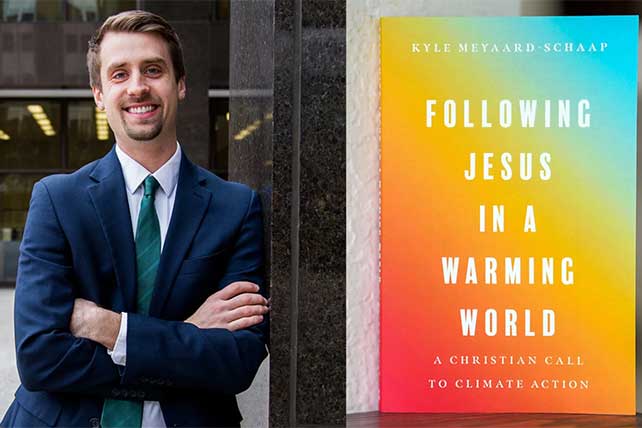(RNS) — When Kyle Meyaard-Schaap was 17, his brother came home from a semester abroad and announced the unthinkable: He was a vegetarian.
“It was as if he announced to the family that he was a dog now,” Meyaard-Schaap told Religion News Service. “I didn’t know anybody who had ever made that choice.”
At the time, a meatless diet didn’t fit into the definition of Christianity he’d learned in his conservative religious community.
“(My brother) helped me understand that him making that choice wasn’t him rejecting all of the beautiful values that we had been taught in our Christian community,” said Meyaard-Schaap. “It was him trying to live more deeply into those values. It was the first time someone had given me permission to consider things like climate change, pollution, environmental degradation through the lens of my faith.”
Years later, Meyaard-Schaap is now the vice president of the Evangelical Environmental Network, a group that advocates for climate action because of, not in spite of, their faith. His new book, “Following Jesus in a Warming World: A Christian Call to Climate Action,” offers personal accounts, theological frameworks and practical advice for Christian climate action.
RELATED: Evangelical Group Releases Climate Change Report, Urges a Biblical Mandate for Action
RNS spoke to Meyaard-Schaap about his book, releasing from InterVarsity Press on Feb. 21. This interview has been edited for length and clarity.
How did your trip to West Virginia complicate your perspective on the climate crisis?
That trip helped me see that creation care equals people care. I think before that, it was easy for me to hide behind the numbers and statistics. I was pretty strident in my convictions around the need to dump fossil fuels immediately and get on a path to clean energy as fast as possible. And I still believe that’s vitally important.
But during my trip to West Virginia, I met people who were shining with pride at how they had kept the lights on in America for decades. They were proud to work in the coal mines. And then on the other hand, many of them were dying from black lung disease or had granddaughters who had pediatric cancer because of the heavy metals that have leached into the drinking water from the contamination from the mine sites. It helped me understand that fossil fuels have done a lot of good for our country, and they brought a ton of people out of poverty. And at the same time, it’s had profoundly damaging consequences on our air, our water, our climate.
It helped me understand that if we’re going to address this with compassion, and in a way that actually does put people first, we have to wrestle with this idea that livelihoods and people are wrapped up in the current status quo. And we need to transition away from fossil fuels immediately, but we have to do it in a way that doesn’t leave these people behind.
What does Jesus’ incarnation have to do with climate justice?
In Jesus, we have the infinite Creator God choosing to take on the stuff of that creation, and to bind himself to it forever. I can’t think of a greater affirmation of the goodness of created things. It’s such a powerful counter narrative to some of the more Gnostic, dualistic theologies that many of us who grew up in the American church in the ’80s, ’90s and early aughts breathed in — the rapture, “Left Behind” theology that says that our souls are what matter, and the body has nothing of eternal importance.
I think the incarnation and the resurrection fly in the face of that and affirm the inherent dignity of humanity and of all created things. It helps us recover a more radically integrated theology that understands body and the soul as inseparable.

